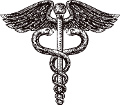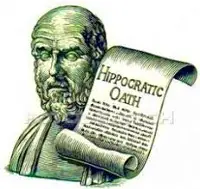Hippocrates: Famed Man of Medicine in Ancient Greece
Sometimes referred to as the "Father of Medicine," Hippocrates is one of the most famous figures of Ancient Greece. His name lives on today in many things medical, including an oath that many doctors still take before beginning their practice. He was born about 460 B.C. on Kos, an island off the Anatolian coast of Turkey. He is mentioned in works of both Plato and Aristotle. Some historians say that his father was named Heraclides and his mother was named Praxitela. His grandfather is believed to have been named Hippocrates as well; both he and his son were physicians and passed on their knowledge and trade to the more famous grandson, who was technically Hippocrates II. He is also thought to have studied under another physician, named Herodicus. Hippocrates (II) likely learned his trade in an asclepion, a healing temple that was sacred to Asclepius, the god of medicine. Patients reporting to these temples would receive physical or spiritual healing. 
Hippocrates is known to have traveled throughout the Greek world and in Asia Minor. A student at the asclepion on Kos, he later returned there as an instructor. Medical practice at that time was largely passive. Treatments were gentle and focused on natural healing, augmented by soothing balms. Hippocrates was particularly fond of prescribing fasting. He is thought to have said, "To eat when you are sick is to feed your sickness." Another familiar prescription of his was to consume apple cider vinegar. He was a firm believer in a patient's need for total rest in order to recover from illness. He was a proponent of what today is called lifestyle medicine, prescribing changes in diet and exercise regimes to combat a disease such as diabetes. He at one point said, "Walking is man's best medicine." He also is credited with divorcing medicine from religion. The Greeks thought that someone who had a disease was being punished by the gods, in the same way that they believed the gods were actively involved in many other aspects of humans' lives. Hippocrates taught that a person's diet, family history, living habits, and even environment could result in the contraction of a disease. Patients were not necessarily dissuaded from praying to the gods for forgiveness and/or healing, but Hippocrates taught that they shouldn't expect intervention from the gods to be the sole reason for either contraction of or release from a disease. The idea of knowing a tremendous number of details about human anatomy and physiology was not a familiar one to the Ancient Greeks, largely because dissection was forbidden. They did do surgery, however, and so they had a working knowledge of some interior parts of the body. Hippocrates is thought to have been the first documented chest surgeon, and many of his theories in this area are still used by doctors today. Hippocrates was detailed and thorough in his stipulations for patient observations, treatment, and surgery. The author of several works, he detailed many of these stipulations in On the Physician. The traditional date given for the death of Hippocrates is 375 B.C. He is thought to have died in Larissa, in Thessaly. He would have been 85. Soranus, another Greek physician, wrote a biography of the "Father of Medicine" 500 years later. A collection of his works, created after his death, has become known as the Hippocratic Corpus. It also includes works by others of his trade; an ancient scribe, perhaps one in the Library of Alexandria, put them together under his name. Included in these works are writings on diagnosis, prognosis, the treating of wounds, the setting of fractured bones, the care of patients, and many other medical practices. His name also lives in in other things. Most famous of these is the Hippocratic Oath. It has been revised several times through the years. Below is the modern version. I swear to fulfill, to the best of my ability and judgment, this covenant: I will respect the hard-won scientific gains of those physicians in whose steps I walk, and gladly share such knowledge as is mine with those who are to follow. Also named after him were:
|
|
Social Studies for Kids
copyright 2002–2024
David White



 I will apply, for the benefit of the sick, all measures [that] are required, avoiding those twin traps of overtreatment and therapeutic nihilism.
I will remember that there is art to medicine as well as science, and that warmth, sympathy, and understanding may outweigh the surgeon's knife or the chemist's drug.
I will not be ashamed to say "I know not," nor will I fail to call in my colleagues when the skills of another are needed for a patient's recovery.
I will respect the privacy of my patients, for their problems are not disclosed to me that the world may know. Most especially must I tread with care in matters of life and death. If it is given me to save a life, all thanks. But it may also be within my power to take a life; this awesome responsibility must be faced with great humbleness and awareness of my own frailty. Above all, I must not play at God.
I will remember that I do not treat a fever chart, a cancerous growth, but a sick human being, whose illness may affect the person's family and economic stability. My responsibility includes these related problems, if I am to care adequately for the sick.
I will prevent disease whenever I can, for prevention is preferable to cure.
I will remember that I remain a member of society, with special obligations to all my fellow human beings, those sound of mind and body as well as the infirm.
If I do not violate this oath, may I enjoy life and art, respected while I live and remembered with affection thereafter. May I always act so as to preserve the finest traditions of my calling and may I long experience the joy of healing those who seek my help.
I will apply, for the benefit of the sick, all measures [that] are required, avoiding those twin traps of overtreatment and therapeutic nihilism.
I will remember that there is art to medicine as well as science, and that warmth, sympathy, and understanding may outweigh the surgeon's knife or the chemist's drug.
I will not be ashamed to say "I know not," nor will I fail to call in my colleagues when the skills of another are needed for a patient's recovery.
I will respect the privacy of my patients, for their problems are not disclosed to me that the world may know. Most especially must I tread with care in matters of life and death. If it is given me to save a life, all thanks. But it may also be within my power to take a life; this awesome responsibility must be faced with great humbleness and awareness of my own frailty. Above all, I must not play at God.
I will remember that I do not treat a fever chart, a cancerous growth, but a sick human being, whose illness may affect the person's family and economic stability. My responsibility includes these related problems, if I am to care adequately for the sick.
I will prevent disease whenever I can, for prevention is preferable to cure.
I will remember that I remain a member of society, with special obligations to all my fellow human beings, those sound of mind and body as well as the infirm.
If I do not violate this oath, may I enjoy life and art, respected while I live and remembered with affection thereafter. May I always act so as to preserve the finest traditions of my calling and may I long experience the joy of healing those who seek my help.
